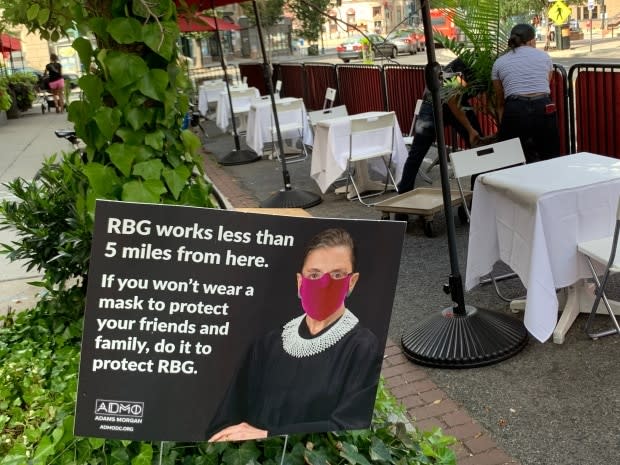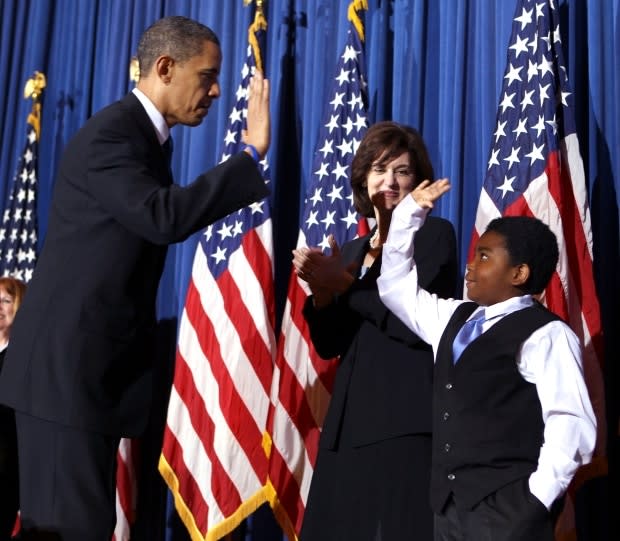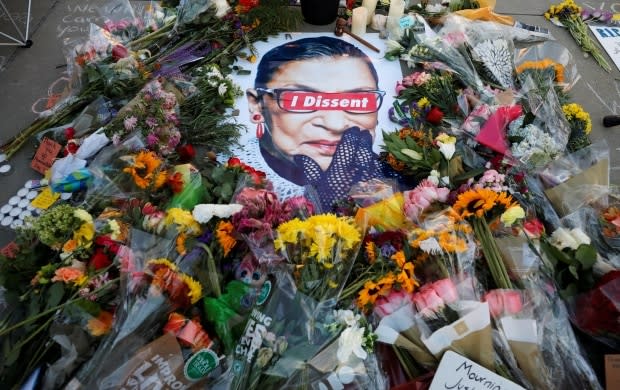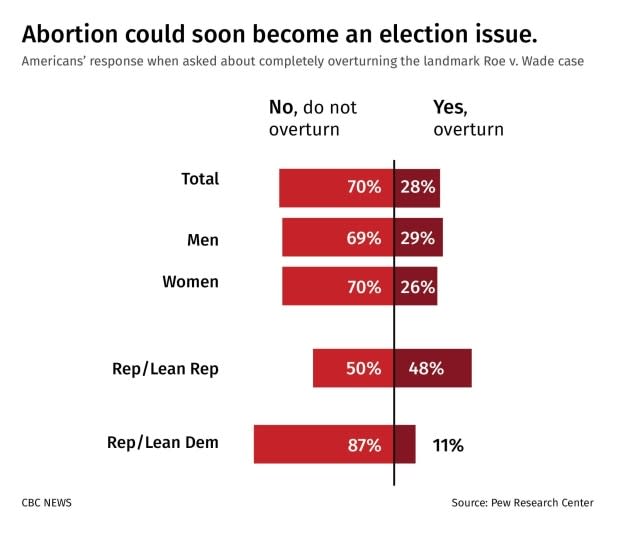5 ways the death of Ruth Bader Ginsburg will transform U.S. politics

It's almost impossible to overstate the transformative effect on American politics ignited by the death of this one woman, at this one moment.
The far-ranging potential consequences from the passing of Ruth Bader Ginsburg, Supreme Court justice and liberal legal icon, will start immediately, beginning in the election campaign that determines whether Donald Trump gets a second presidential term.
And they could last for decades in the staggering array of issues to be litigated before the court — some of whose consequences reach far beyond America's borders and could have global repercussions.
Here are five changes prompted by her death.
It pours fuel on an overheating election
It's been distressingly common to hear this election described as a do-or-die moment for American democracy.
It was the theme of Barack Obama's speech to the Democratic convention. Meanwhile, figures inside the Trump administration, and close to the president, and on talk radio, have evoked scenarios of post-election violence.
There are books, essays and newspaper articles in which political scientists sound alarm bells about the durability of the American republic.
Which is to say this election was already heated enough, with a president insisting he's being cheated, legal fights over mail-in voting, deaths at protests and armed demonstrations.
The stakes have now risen.

"I'm genuinely worried," Pulitzer Prize-winning American historian Joseph Ellis said in an interview Saturday.
"The fate of the republic [has not been] genuinely at stake [since the Civil War].… I think we're in a moment analogous to that now."
Republican Sen. Marco Rubio tweeted that America will face its most difficult months in a generation, and asked for prayers for the country.
It means conservative court dominance, potentially for decades
The court recently had a 5-4 conservative tilt. It's now 5-3, and will be 6-3 if Trump gets his nominee confirmed.
The Supreme Court has gained power throughout American history, starting in the 19th century, in its interpretive role over U.S. law.
Now, as bitter partisanship makes it harder to pass bills in Congress than a few decades ago, parties frequently rely on courts to resolve political disputes.
One big case before the new, Ginsburg-less court involves a challenge to the law known as Obamacare — hearings are scheduled for Nov. 10 on the Affordable [Health] Care Act.

Obama's signature law, which extended health coverage to millions, appears in grave danger: the law survived one earlier challenge by a single vote.
Other cases this fall will touch on workplace benefits, and on the right of publicly funded religious institutions to exclude same-sex couples.
This court could even decide the presidential election.
In 2000, the high court ended a Florida recount and made George W. Bush president; the numerous fights this year over mail-in ballots could be far, far messier.
Longer-term battles are inevitable over abortion, and over myriad presidential executive actions. Take climate-change regulations and immigration rules.
Obama signed a flurry of such climate and immigration executive orders; future ones would inevitably be challenged in a more hostile court.
"It would be the strongest conservative majority we've seen," former U.S. federal prosecutor Joseph Moreno told CBC News.
"[Now you have chief justice] John Roberts potentially sometimes voting with the minority. [But with a change now] you'd have a potentially secure block of conservative votes.
"That would impact so many things in this country."
Other big changes could be economic. In his book, Supreme Inequality, author Adam Cohen argues that the U.S. Supreme Court has, for most of American history, favoured the wealthy and powerful, with a rare exception being the 1960s court led by Earl Warren.
He said the court has recently been a major driver of American inequality — stripping away union powers, allowing corporate money into politics and undermining the integration and funding of schools in minority areas.
Page 1 of his book carries an anecdote about Bader Ginsburg: she wrote the dissent for the losing side in a case involving a Black woman subjected to racist abuse at work.
It upends the election focus
The court fight threatens to overshadow the presidential election issue Democrats hoped to focus on: the pandemic, which has killed around 200,000 Americans.
It will play out, day after day, as voters cast ballots. Voting has already started. Ballots are being mailed out, and in-person polling stations are open in some states.
The Supreme Court has been a winning issue for Trump before. In 2016, more than a quarter of Trump voters told pollsters it was the reason they voted for him.
Trump cemented his alliance with social conservatives by vowing to name only conservatives to the court, and he took the unusual step of releasing a list of candidates in advance.
He's done it again: Trump released his new list of picks just over a week ago. He's promised to announce his choice, likely a woman, within days.
Intriguingly, when asked Saturday about one candidate, Barbara Lagoa, Trump praised her and mentioned, unprompted, that she was "Hispanic" and "from Florida" — a critical voting group in a critical swing state.

There's no guarantee this issue will help him. The intense upcoming debate on abortion is no slam-dunk for conservatives.
Some polling suggests a strong majority of Americans want to preserve, at least in part, the landmark abortion-rights decision Roe v. Wade.
It's one of the first points mentioned in a fundraising letter to supporters from Democratic VP candidate Kamala Harris.

"Today, we fight for [Bader Ginsburg's] legacy," said Harris' note.
Democratic donors certainly appeared energized: the party said it raised tens of millions of dollars in the hours after Bader Ginsburg's death.
In an inimitably American political phenomenon, both parties were actively fundraising upon the judge's death.
The Trump campaign released a similar message to supporters.
The sudden effect of this debate will likely resonate unevenly across the country, helping Republicans in some places but not others.
It's illustrated in the different reactions from Republican senators involved in tough re-election fights.
Just compare their reactions to a map showing church attendance rates per state: Republicans running in more religious states dove headfirst into the fight, which will inevitably raise hot-button social issues.

North Carolina's Thom Tillis, Kelly Loeffler of Georgia, and South Carolina's Lindsey Graham, who heads the justice committee in charge of the process, vowed to support a nomination immediately.
By contrast, Colorado's Cory Gardner dodged various questions on the topic and released a vague statement; Susan Collins of Maine said the presidential election winner should get to make the pick.
There's some reason for optimism for Democratic nominee Joe Biden: surveys in three smaller swing states this week suggested he's more trusted on court appointments than Trump.
It triggers a brawl on Capitol Hill
The power to pick judges rests with the president. The power to confirm them belongs to the Senate.
Right now Republicans control the Senate with 53 votes, to 47 Democrats and Democratic-leaning Independents.
Those numbers would not, until recently, have guaranteed confirmation: for generations, 60 votes were required for most major actions in the Senate, but because Congress is so frequently paralyzed, first Democrats, then Republicans, began chipping away at the so-called filibuster rule.
Now it takes a simple majority, of 50 or 51, to confirm a judge. And it will be close.
The first question is how quickly Republicans proceed. Trump tweeted his own suggestion that the party move fast: "We have this obligation, without delay!"

His party has flexibility on timing a final vote. It can happen before or after the Nov. 3 election: the current Senate term lasts two months beyond the election, until Jan. 3, and the current presidential term lasts until Jan. 20.
It's taken an average of just over two months to confirm justices since the 1970s. It used to be faster, in less-partisan eras, and it could be faster again with the new simple-majority rule.
Democrats are vowing to put up whatever fight they can — with legislative delay tactics, threats of revenge if they regain the chamber and efforts to embarrass Republican senators in tough re-election races.

Then there are the insults.
Both parties are calling each other hypocrites: Republicans for reversing themselves on their 2016 declaration that presidents shouldn't name a judge close to an election, and Democrats for reversing themselves in the other direction.
Yet Republicans likely hold the upper hand in this nomination battle. They controlled the Senate in 2016 and they control it now.
It foreshadows a clash over institutions
The Republican Party has won the popular vote in a presidential election precisely once since 1988. Yet it has a stranglehold over the Supreme Court.
And Democrats are livid.
There are growing calls within the party to overhaul the country's institutions to make them more representative of the country's actual, increasingly diverse, demographics.
Obama spelled out some of this agenda in his eulogy for the late civil-rights hero John Lewis: he called for full votes in Congress for Washington, D.C. and Puerto Rico, a new voting-rights law and an end to the Senate's 60-vote filibuster rule.
Many progressives want to go even further — and expand the Supreme Court: meaning add new judges.
Biden has opposed the idea and said Democrats would come to regret it.
But the idea is growing on the left.
Nearly half the party's presidential candidates said they were open to it. Sen. Bernie Sanders has raised the idea of rotating judges between upper and lower courts.
The Democrat who leads the House of Representatives Judiciary Committee on Saturday said that if Republicans proceed with this nomination, Democrats should immediately move to expand the court should they win the Senate.
Franklin Roosevelt famously failed in an effort to pack the court in the 1930s.
He was frustrated that conservative judges were blocking aspects of his New Deal, the Depression Era social-safety net and public-works program.
Cohen's book says Roosevelt achieved something even if he failed to pack the court: after that, the judges stopped cancelling his policies.
Democrats' leader in the Senate, Chuck Schumer, has left open the possibility of shifting to a simple majority vote on all bills if his party wins back the chamber.
On Saturday, in a conference call with party members, several outlets reported him saying that if Republicans replace Ginsburg now, "Nothing is off the table."


